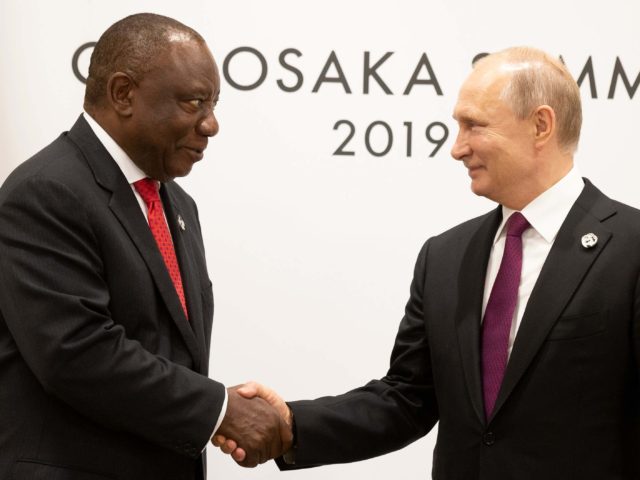A FORMER South African Leader of the Opposition in Parliament has warned that his country’s lacklustre approach to Russia’s invasion of Ukraine could place the country in danger of wrecking its special status under USA-sponsored African Growth and Opportunities Act.
In a column in the main English-language Arena newspaper group, Tony Leon, who is now in the communications business, warned that “by thumbing our nose at the West, things can only go south.” He pointed out that although South Africa is a member of the trading bloc BRICS ––which also includes Brazil, Russia, India and China — South African trade with Russia remained tiny compared to the United States and Nato countries.
In what can only be described as a diplomatic mess International Relations and Co-Operation Minister Naledi Pandor first condemned the Russian invasion. But just as President Joe Biden’s call for Russian President Vladimir Putin to be ousted was contradicted by the White House, the South African presidency quickly watered Pandor’s stance down. It was followed by South Africa abstaining in the U.N. Assembly vote condemning the Russian invasion.
South Africa’s billionaire President Cyril Ramaphosa clearly wanted to keep close ties with Russia, which his predecessor Jacob Zuma had aggressively courted to secure a nuclear contract. Although the nuclear deal was stopped in its tracks by huge opposition from opposition parties, there remain lingering rumours of Russian money making the deal sweet for South Africa’s ruling African National Congress.
In addition, South Africa has opened bidding for a gas aggregator for a gas-to-electricity project at the Coega special economic zone in the Eastern Cape. Gazprombank — Russia’s state-owned gas supplier — confirmed to news agency amaBhungane that they were considering a bid for a multi-billion dollar contract.
Ramaphosa — who is credited for being a chief architect of South Africas’s liberal, rights-based constitution — contradicted his foreign minister in Parliament: “The war (between Russia and Ukraine) could have been avoided if NATO had heeded warnings from among its own leaders and officials over the years that eastward expansion would lead to greater, not less, instability in the region.”
Ignoring pressure to condemn the invasion of a sovereign country — including from the official opposition Democratic Alliance and smaller parties like the Inkatha Freedom Party — Ramaphosa said he would resist calls to condemn Russia, but added that South Africa could not condone “the use of force and violation of international law.”
The president’s comments were widely interpreted as undermining any hope that he would be viewed as an independent mediator in the conflict, a role he has played in Ireland.
Reading the political tea-leaves in the United States, Leon — who bounced his tiny Democratic Party to official opposition status in 1999 — warned that the Republicans may well take control of Congress, the Senate and the presidency by the time the Africa Growth and Opportunity Act (AGOA) comes up for renewal in 2025.
He stuck his predictive neck out by suggesting that barring some “electoral miracle” for the Democrats, even the White House could be in GOP hands by 2024. He went so far to suggest that former UN Ambassador Nikki Haley — who is a leading Republican with strong support among non-Trump supporters – could well be the next president of the United States.
The end of South Africa’s special trading relationship with the U.S. would have negative implications for the motor vehicle manufacturing industry in particular. AGOA has boosted South Africa-U.S. trade from R56 billion – when the law was enacted during the Bill Clinton presidency in 2000 — to what Leon described as “a whopping” R150 billion today.
AGOA provides tariff-free access for motor vehicles exported by South Africa to the USA. South Africa houses major vehicle manufacturing plants, including Toyota, Mercedes Benz, Volkswagen and BMW, providing much-needed employment in a country that is already starved of jobs. Youth unemployment runs at 75 percent.
Any change in the special status enjoyed by South Africa under AGOA would have catastrophic implications for the country. Leon warned that Haley’s world view “is likely to be dominant one in the U.S. administration” when AGOA is up for renewal in 2025.
South Africa could end up paying “a huge price” for siding with the Kremlin at a time of an unjust war.
Donwald P Pressly is a veteran South African parliamentary correspondent. He is a former Menell Spring Fellow at Duke University, North Carolina. He graduated from Rhodes University in South Africa where he focused on African politics and journalism.

COMMENTS
Please let us know if you're having issues with commenting.